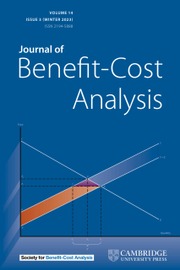This special issue of the Journal of Benefit–Cost Analysis is dedicated to the memory of Jerry Ellig, a brilliant economist whose untimely death in 2021 cut short a productive and influential career in government and academia. Jerry was adept at applying economic concepts and empirical analysis to improve public policy, and he enjoyed not only studying real policy problems, but finding practical solutions to them. He was also a generous mentor, supporting and collaborating with graduate students and colleagues to publish prolifically in peer-reviewed economics, public administration, and political science journals, as well as law reviews and more popular outlets. He was a great communicator, able to take his academic work and translate it for different audiences, including through testimony, seminars, op-eds, short presentations, and classroom teaching. In addition to these immense talents, Jerry was genuinely kind and unpretentious; he wore Wal-Mart suits and garish ties. And he was laugh-out-loud funny, a master at diffusing difficult situations with a witty, but never mean, quip.
To honor his memory, this issue brings together articles from people who had the good fortune to know him. It includes several articles on which Jerry was collaborating at the time of his passing. The article by Christopher Carrigan, Zhoudan Xie, and Jerry examines whether and how agencies’ regulatory impact analyses affect the outcome of litigation over regulations. In another article, Wayne Leighton, Giulia McHenry, and Jerry review the Federal Communications Commission’s (FCC) reorganization of economists to offer ideas for other federal agencies. And Jerry and I draw lessons from the experiences of three waves of regulatory reform in the United States.
Several other articles cover topics on which Jerry made significant contributions during his career. Those include Thomas Hazlett’s critique of the FCC’s benefit–cost analysis for allocating spectrum, and Robert Crandall’s examination of whether telecommunication carriers’ vertical integration has led to anti-competitive behavior. Two other articles reflect the kind of applied empirical methods that were prevalent in Jerry’s work. Bridget Dooling and Kristin Hickman lay out a framework for examining whether executive oversight of tax regulations leads to improved regulatory impact analyses. Sean Mulholland applies a political economy lens to review legislation regarding automobile tire pressure, and then empirically measures the safety impact of the implementing regulations. This volume also offers shorter essays from people who knew Jerry, the man, as well as Jerry, the economist. Reeve Bull, Richard Williams, Patrick McLaughlin, and Tyler Richards reflect on Jerry’s contributions as they suggest insights of their own that build from his work.
The range of topics in this issue mirrors the breadth of Jerry’s work and reminds us that economics is a useful art, as well as a science. Jerry’s legacy is not just that he contributed to our understanding of the world; he also helped to make it a better place.


